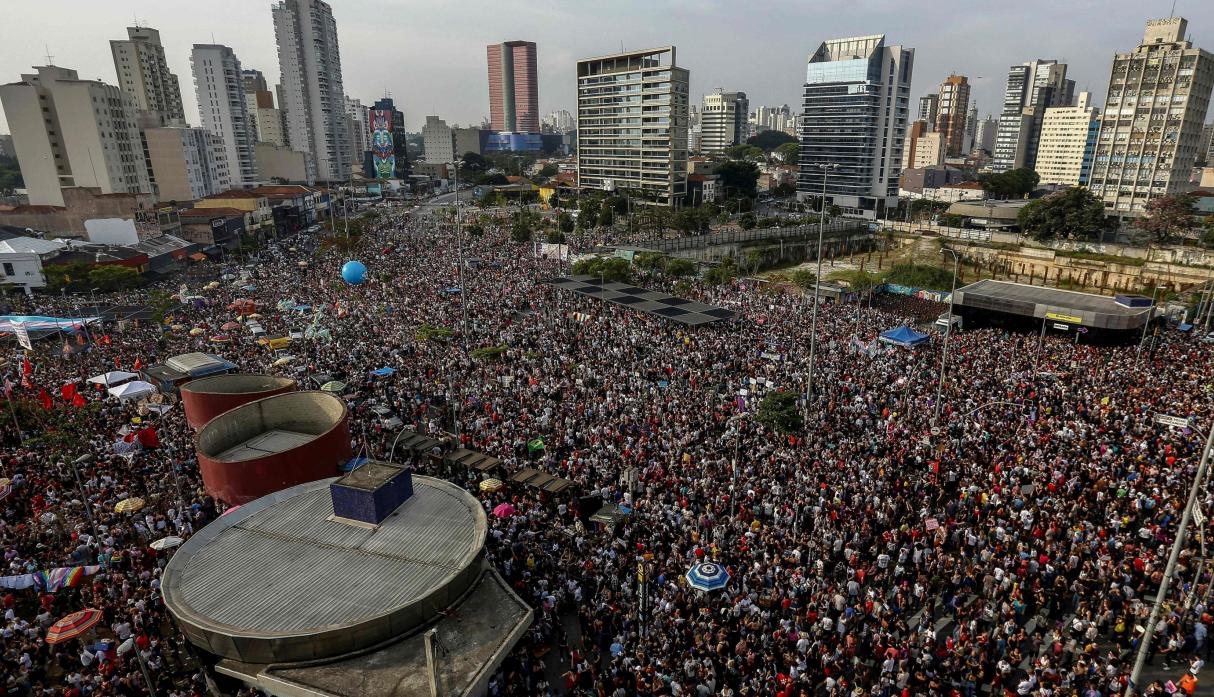The arrival through elections of a fascist government to the strongest economy of Latin América compel us to rethink the actions of the working class and the socials movements regarding to this new phenomenon that was already rising in Europe and now arrived to South America, and puts in risk not only the conquered rights but also the life of many in our region.
The Bolsonaro phenomenon introduces the question about what happened since 2002 until today, since Lula assumed the presidency in Brazil at an historical election, starting a new century that ended the neoliberal experience initiated in the 90’s. On one hand, we must think of the causes of this strong hate to the Partido de los Trabajadores (PT) and to the left progressive forces in general. On the other hand, we must assume that the proven corruption cases of some public servants, no matter the country and the politic party they belong, generate repudiation, and this magnifies when it comes from left political forces. Neither can we lose sight of the question about the role of some sectors of the evangelical church, the military power and of course the judiciary power, that have a wide influence on the Brazilian politics. This is connected with other question, about why is Brazil so permeable to the active role of the armed forces in the democracy of the. This feature was already shown in the illegitimate government of Michel Temer, but it may be strengthen during the Jair Bolsonaro government starting on January 2019.
There is a Brazil that we know through the history books and the literature where we can easily understand the slavery history that took place there which result in a high portion of the afro descendent people in the country. But along the years this slavery logic has not disappeared. Instead of that, it remained as an underground current along with racism, conservative, homophobic trends and hate to the poor people, workers and leftist that together formed an underground Brazil that now rise with Bolsonaro.
¿Why is this happening? Because the PT, during its thirteen and half years of government tried to break this underground hate integrating the subjugated majorities of people to the citizenship and guaranteed them social rights by public policies from the State. In this sense, the World Bank had emphasized the incorporation of 38 million people to the middle class, meaning they left the poverty, during the PT government. This institution also emphasized the integration of a million and a half of students to the public university, who are mostly afro descendents and poor people that had before a restricted access to the superior education. This was possible by the creation of thirteen new public universities in all the country. The development of the amount of university students in Brazil was of a 275% in ten years, while in Latin America was only of 75%.
The political project represented by the PT was orientated to the incorporation of many portions of the population that were historically excluded from citizenship and became people with access to full rights. This was radically opposed to the Brazil slavery and racist logic. There are no precedents of public policies where the State assumed the decision of guarantee rights with this massiveness in brazilian history.
In just two years of Michel Temer government, from the 38 million people integrated by the PT, around 30% were returned back to the poverty. In the same direction, the unemployment that during the Lula governments fall down to 4.8% making achievable the idea of “full employment” in Brazil, today reaches the 12%. In continuity to the Temer policies, the project of Bolsonaro is to reduce the State size and set aside the sovereignty about strategic natural resources by the privatization of emblematic state companies in Brazil. Bolsonaro represents a neoliberal model in the economic side and fascist in the political side, that not only may destroy the possibility of a sovereign and sustainable development in Brazil but is dangerous for all the region because, according to the declarations of the future economy minister Paulo Guedes who stated that MERCOSUR will not be a priority, puts in risk the regional integration and productive complementarity sought both in the MERCOSUR and through the already weakened UNASUR. This will imply the possibility of new and dangerous alliances mainly with the United States and Israel in the military side and with the European Union in the economic side, including the possibility of reissue terrible initiatives like the FTAA against which we fervently resisted in the past.
For that reason, the figure of Bolsonaro is very dangerous for the region as it can generate a contagious effect, but it only was possible with the previous criminalization of the PT and the proscription of its maximum leader leaded by the strong alliance of mass media and judiciary. In this way this way a campaign directed to make the PT responsible of all the bad things in Brazil and put it as the best example of corruption that sank the country in misery. The social networks, because of the limits to control the contents they host, were the perfect vehicle for this surgical campaign.

For all of these reasons, we must underline the 30 million votes achieved by the PT in the first electoral round, especially having in mind that its candidate had only a month and a half to settle in the public agenda and to campaign. In addition to that, the 16 million extra votes obtained by the PT in the ballotage demonstrate that there is a country willing to resist, fight and still compromised both in the streets and in the ballot box with the fight against the fascism, to reject the delivery of the Brazilian patrimony in regards to natural resources and acquired social rights, postulating the defense of the sovereignty against the neoliberalism, the commitment with the peace, the social justice and the democracy. Against the threat of Bolsonaro about forbid the activism and practice the violence and privation against the opposition there is resistance: as workers, trade unions and social movements we say no to prison and exile, we will fight in the streets. For this fight, revalidate and deepening alliances will be crucial, as we started doing it since 2016 from the “Jornada Continental por la Democracia y contra el Neoliberalismo” (Continental Day for Democracy and Against Neoliberalism), to guarantee our bet for the popular participation to determine the politicies for social justice. The third round had just began.
*By Adolfo Aguirre, Secretary of International Relations from CTA Autónoma
